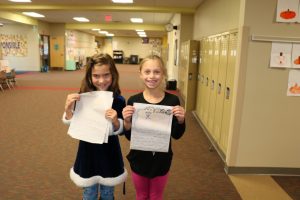Second Graders Prepare Personal Narrative Stories for Conferences
Parent teacher conferences for elementary age students are this week, and students have been preparing to share their work and what they’ve learned with their family. Stephanie Bolten’s second grade class at Waukee Elementary has prepared by utilizing their writing, spelling, grammar and editing skills to craft personal narrative stories to share with their families during conferences.

KaeDee Laughery (left) and MaKenna Champlin (right) proudly display their personal narrative stories.
Bolten placed emphasis on the editing process of stories during this unit, urging students to edit as they write.
“As a class, we started this unit by reading personal narrative mentor texts, which were examples from other students,” Bolten said. “While crafting the story, we would take time to “express lane edit,” which means we edit during the writing process, rather than just at the end. We have focused heavily on capital letters, punctuation, and complete sentences as well as making our story one that readers will enjoy reading!”
MaKenna Champlin and KaeDee Laughery made sure to choose topics they remembered vividly and could tell in great detail during their stories.
“I wrote about the first time I saw Mt. Rushmore with my family,” Champlin said, a nostalgic smile tugging at her lips. “It felt really special because I like seeing things made a long time ago.”
Champlin said she enjoys history and aimed to focus on editing during the writing process of her story.
“Editing helped the most,” Champlin said. “It makes the story easier and more fun to read.”
Laughery agreed that editing played a huge role in improving her own story, which she wrote about a time she received an injury while in Arizona with her family.
“I really like writing the words and reading them as they go on the page,” Laughery said. “Editing makes everything look even better. One time I wrote ‘we’ when it was actually supposed to be ‘he’ and editing helped me fix that.”
Bolten said each student has done well to choose a specific moment in time to write about, which she refers to as “the seed” moment. This “seed” starts as a single idea that grows as the story is crafted.
“This project enables students to take their time with the writing process and to push themselves to make their writing great,” Bolten said. “Writing is a process, and I think students are beginning to realize that they are never fully ‘done’.”

